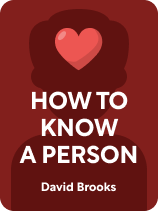

This article is an excerpt from the Shortform book guide to "How to Know a Person" by David Brooks. Shortform has the world's best summaries and analyses of books you should be reading.
Like this article? Sign up for a free trial here.
Do want to know how to improve your social skills? Do you sometimes center the conversation back on yourself?
As we practice learning to know others, we often have to work to counter some of our natural tendencies. These include the tendency to see things in a self-centered way, to be impatient rather than empathetic, or to shy away from the messy parts of others’ lives.
Let’s take a look at how you can work on these tendencies by improving your social skills.
1. Learn to Center Others, Not Yourself
We’re all at the center of our own worlds, and we naturally center ourselves in our thoughts and our conversations. Brooks explains that you’ll know you’ve mastered how to improve your social skills when you step back from your ego and how it wants you to see the world. That’s when you make more room for other people. A great place to start is in the conversations you have every day with others. We all love talking about ourselves, and we sometimes find it challenging to talk about someone else for a change. By learning to resist the tendency to turn the conversation back to yourself—like by telling a friend who’s having trouble with a colleague about your own struggles at work—you can do a better job of being present with them.
Another way Brooks recommends exercising care for others is to pay attention to social situations and to make them more comfortable and equitable for everyone. If there’s a major difference between you and another person—whether in political views or in the amount of power or access you have in a given context—it’s easy for you to make them feel misunderstood or excluded. Brooks advises working to put everyone on even footing so you can exchange ideas respectfully and authentically. For example, you might go into a meeting at work with more seniority than others in the room. But if you take the time to discuss everyone’s opinions, you’ll put your junior colleagues at ease and help them feel their voices are heard.
2. Practice Empathy
Just as we tend to center ourselves, we can also naturally be impatient with people and jump to conclusions about how they’re handling a conversation or a situation. But Brooks explains that by practicing the skill of empathy, you can set yourself up to better understand others. He explains that empathy involves three skills: mirroring, mentalizing, and caring. Mirroring and mentalizing involve understanding the emotions that someone else is feeling in their current circumstances, either by experiencing those emotions yourself or by remembering what you felt in a similar situation. Caring involves centering the other person’s needs—which will often be different from what you would want or need if you were in a similar situation.
| The Different Kinds of Empathy Mentalizing and mirroring correspond with two different kinds of empathy—cognitive and emotional. Cognitive empathy involves understanding others’ emotions without necessarily feeling them yourself (mentalizing), while emotional empathy entails actually experiencing the emotions of others (mirroring). Cognitive empathy, also called “theory of mind,” develops as children grow and enables most people to form ideas about others’ mental states. Some people, including many with autism spectrum disorders, feel emotional empathy more intensely than others. Both kinds of empathy—along with the care Brooks writes we should exercise for others—give us different ways of feeling connected to other people. |

———End of Preview———
Like what you just read? Read the rest of the world's best book summary and analysis of David Brooks's "How to Know a Person" at Shortform.
Here's what you'll find in our full How to Know a Person summary:
- The benefits of really getting to know other people
- How to better understand people on a personal level
- Why our morality and relationships are in a crisis






